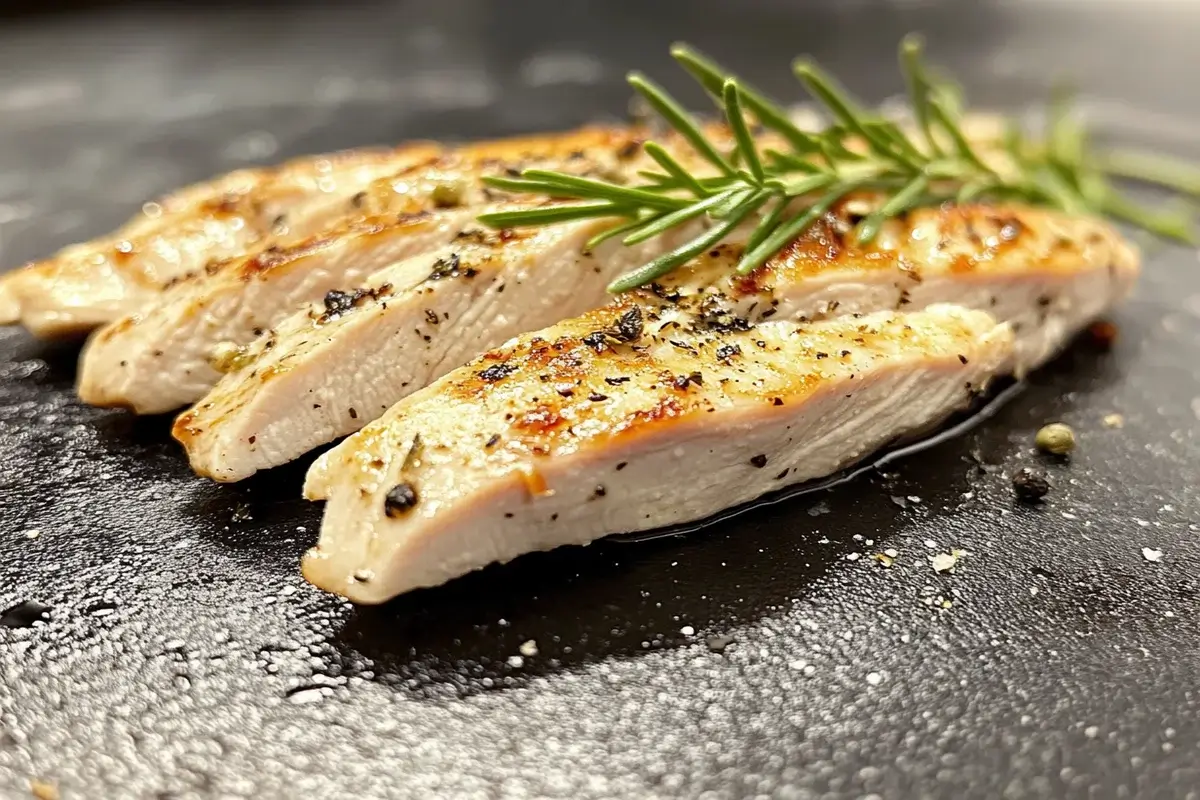Cooking thin chicken breasts can be tricky because they tend to dry out easily. However, with the right methods, you can ensure they stay moist, juicy, and delicious. Let’s dive into some of the best practices to avoid dry chicken and achieve perfectly tender results every time. Prevent dry chicken breasts
Why Moisture Matters When Cooking Chicken Breasts
Chicken breast is naturally a lean cut, which means it lacks the fat content necessary to retain moisture on its own. Overcooking it will almost always lead to dry and rubbery meat. This is why it’s essential to focus on keeping the chicken moist, whether through cooking techniques or pre-cooking preparations.
One effective method for locking in moisture is to use a marinade. A good marinade infuses flavor and helps tenderize the meat. Ingredients like yogurt, buttermilk, or vinegar work wonders. Using a meat thermometer is another critical strategy; it helps you ensure your chicken reaches the perfect internal temperature of 165°F (74°C) without overcooking. For more on this topic, check out how to use a meat thermometer for perfect cooking results.
Proper Preparation Before Cooking
Tenderizing the Chicken Breast
Pounding the chicken breast to an even thickness is key. This ensures that all parts cook evenly, avoiding dry, overcooked edges. To tenderize:
- Use a meat mallet or even a heavy rolling pin.
- Cover the breast with plastic wrap before pounding.
- Aim for about 1/4 inch thickness.
Tenderizing the chicken also helps break down the muscle fibers, making the chicken more tender and ensuring it cooks more evenly. Even cooking is crucial when dealing with thin cuts, as it prevents parts of the chicken from drying out while other parts are still cooking.
Marinating and Brining
A good marinade adds both moisture and flavor to thin chicken breasts. Let your chicken sit in a marinade that contains oil, acid (like lemon or vinegar), and spices. Marinate for at least 30 minutes, but overnight is ideal. The acidic components in a marinade help break down proteins, making the chicken more tender while adding a burst of flavor.
Brining is another option. Create a simple brine with water, salt, and sugar, and let the chicken soak for about an hour before cooking. Brining helps retain moisture and improves tenderness, especially if frying or grilling. The salt in the brine allows the chicken to absorb more liquid, which helps keep it juicy even after cooking.
Cooking Methods to Retain Moisture How to keep thin chicken breasts from drying out
Poaching
Poaching is a gentle cooking technique that involves simmering the chicken in water or broth. It’s one of the best ways to ensure your chicken breast stays juicy. Simply:
- Bring your liquid to a gentle simmer.
- Add the chicken breasts and cook until they reach an internal temperature of 165°F.
- Use broth instead of water for added flavor, and consider adding herbs and spices to the poaching liquid to infuse extra taste.
Pan-Searing and Baking
Pan-searing followed by baking is another effective method. Start by searing the chicken in a hot skillet for a golden crust. Then finish cooking it in the oven at a lower temperature to avoid overcooking the center.
- Tip: Always use a meat thermometer to check the internal temperature.
Searing helps lock in the juices by creating a flavorful crust, while baking at a lower temperature ensures that the inside cooks slowly and evenly without drying out.
Grilling Techniques
Grilling can yield a tasty, smoky flavor. Make sure to oil the grill and keep the heat at medium. Turn the chicken regularly to avoid charring while maintaining moisture.
- Indirect Grilling: For even better results, consider indirect grilling. This involves placing the chicken on a cooler part of the grill, away from direct flames, which helps prevent the exterior from drying out before the inside is fully cooked.
Slow Cooking Techniques
Cooking the chicken “low and slow” can prevent it from drying out. Use a low heat setting in a slow cooker or oven for a longer time. This method helps break down proteins more gently, resulting in a tender outcome.
Slow cooking is particularly useful for infusing flavors, as the long cooking time allows any herbs, spices, or liquids to deeply penetrate the chicken. This results in a juicy, flavorful meal that’s hard to achieve with quick cooking methods.
Additional Techniques to Maintain Moisture How to keep thin chicken breasts from drying out
Using a Meat Thermometer
Using a meat thermometer is critical for cooking thin chicken breasts. Insert the thermometer into the thickest part of the chicken, and once it hits 165°F, remove the chicken immediately to prevent it from overcooking.
A meat thermometer takes the guesswork out of cooking, ensuring that your chicken is cooked to a safe temperature without losing its juiciness. Overcooked chicken is often dry, and undercooked chicken can be unsafe to eat, making the thermometer an invaluable tool.
Basting
Basting involves spooning hot oil or butter over the chicken as it cooks. This ensures the surface remains moist and prevents the chicken from drying out during the cooking process.
- When to Baste: Baste every few minutes while cooking, especially if pan-searing or grilling. Using herbs in the basting butter can also add a layer of flavor to the chicken.
Resting the Chicken After Cooking
After cooking, rest the chicken breast for 5-10 minutes before slicing. This allows the juices to redistribute evenly, leading to a juicier final product.
Resting is a crucial step that many people skip, but it makes a significant difference in the final texture of the meat. If you cut into the chicken too soon, the juices will run out, leaving the meat drier than if it had been allowed to rest.
Slicing Against the Grain
To keep the chicken tender, slice it against the grain. This technique breaks up muscle fibers and makes each bite easier and juicier.
- Why It Matters: Cutting against the grain shortens the muscle fibers, which makes each piece more tender and ensures a better mouthfeel. Always use a sharp knife to avoid crushing the meat.
Sauces, Toppings, and Serving Methods How to keep thin chicken breasts from drying out
Adding sauces and toppings to cooked chicken breast can also help maintain moisture. Consider using:
- Pan Sauces: After searing the chicken, deglaze the pan with broth or wine and pour over the cooked chicken. This adds extra moisture and flavor.
- Compound Butters: Mix softened butter with herbs and spices and spread it over the chicken. The butter melts into the meat, adding richness and preventing dryness.
- Creamy Sauces: Top the chicken with a creamy sauce like pesto or salsa to enhance moisture. Cream-based sauces are particularly effective in keeping the chicken juicy.
- Serving Suggestions: Serve the chicken with a side of vegetables that also have some sauce or dressing, which helps maintain moisture and keeps the entire meal balanced and flavorful.
Storing and Reheating Chicken Breast
Proper Storage Techniques
If you have leftover chicken, store it properly to maintain moisture. Place it in an airtight container and refrigerate for up to three days.
- Freezing: Wrap individual chicken breasts in foil or plastic bags, ensuring as little air as possible to prevent freezer burn. Vacuum-sealing is an even better option for long-term storage, as it helps preserve both flavor and moisture.
Reheating Methods
Reheat cooked chicken breasts gently to avoid drying out. Add a bit of broth or water before reheating in the oven, stovetop, or microwave. Cover the dish to keep the moisture in.
- Oven Reheating: Place the chicken in a baking dish, add some broth, and cover with foil. Bake at 300°F until heated through. This method helps maintain the chicken’s juiciness.
- Microwave Reheating: Place the chicken in a microwave-safe dish, add a small amount of water or broth, and cover with a microwave-safe lid or plate. Heat in short intervals to avoid overcooking.
Common Mistakes and How to Avoid Them How to keep thin chicken breasts from drying out
Cooking at High Temperatures
One common mistake is cooking chicken breasts at too high a temperature, which causes moisture to evaporate quickly. Instead, use medium to low heat and cook slowly for juicy, tender chicken.
- Solution: If you need to cook quickly, sear the chicken on high heat for a short time and then reduce the temperature to finish cooking gently. This method helps retain moisture while achieving a nice crust.
Not Defrosting Properly
Make sure to defrost your chicken completely and bring it to room temperature before cooking. This prevents the outside from cooking faster than the inside, which often leads to dry meat.
- How to Defrost: For best results, defrost chicken in the refrigerator overnight. If you’re short on time, use the defrost setting on your microwave, but be careful not to start cooking the chicken during defrosting.
(FAQs) How to keep thin chicken breasts from drying out
How long should I marinate chicken breasts to keep them moist?
Marinate for at least 30 minutes, but for the best results, leave the chicken in the marinade overnight. The longer the marination, the more flavorful and tender the chicken will be, as the marinade has more time to penetrate the meat.
What is the best cooking method for juicy chicken breasts?
Poaching, pan-searing followed by baking, or slow cooking are the most effective methods for retaining moisture. Each method has its own advantages, but all focus on gentle cooking to prevent moisture loss.
Why do my chicken breasts turn out rubbery?
Rubbery chicken often results from overcooking or cooking at too high a temperature. Ensure you are monitoring the internal temperature and cooking slowly. Using a meat mallet to tenderize before cooking can also help prevent a rubbery texture.
Can I reheat cooked chicken without losing moisture?
Yes, reheat gently with added moisture, such as broth, and always cover the dish to keep steam in. The key is to use low heat and to add liquid, which helps rehydrate the meat during reheating.
How can I prevent my chicken from sticking to the pan while searing?
Oil the pan well and make sure it’s preheated before adding the chicken. You can also use non-stick cookware or add a small amount of butter along with the oil to help prevent sticking.
Conclusion How to keep thin chicken breasts from drying out
Cooking thin chicken breasts doesn’t have to be challenging. By following these techniques—from tenderizing and marinating to using the right cooking method and storing leftovers correctly—you can consistently achieve juicy and flavorful results. Remember, patience and attention to detail go a long way in mastering the art of moist chicken breast.
Experiment with different methods to find what works best for you, and soon you’ll be able to cook perfectly juicy chicken breasts every time. Whether you’re grilling, baking, or pan-searing, keeping moisture in mind is the secret to creating a delicious and satisfying dish. Practice these techniques, and your family and friends will always look forward to your perfectly cooked chicken breast dishes.
For more cooking tips that enhance flavor without extra ingredients, check our tips on making dishes flavorful with minimal effort.

